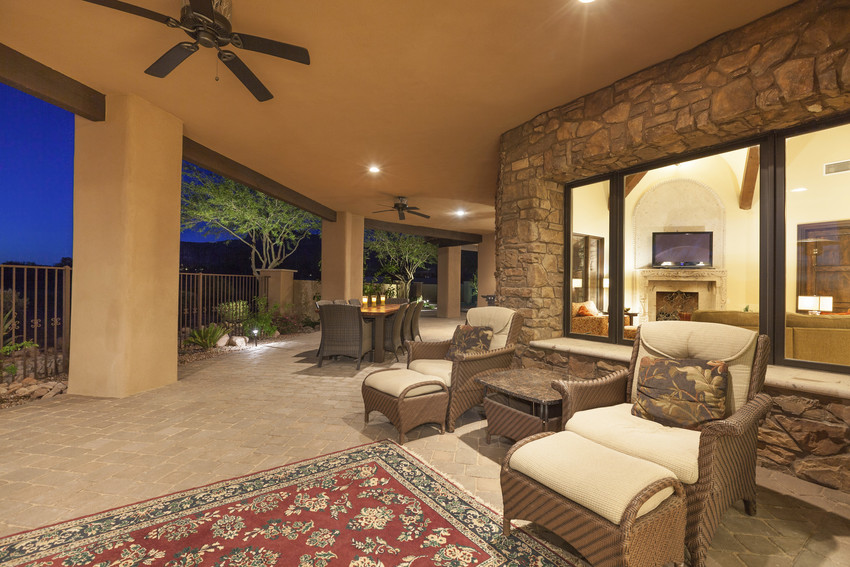Spring is upon us, and with spring comes another anticipated time of year: home selling season. Traditionally, spring is one of the most popular times to list a home for sale. It’s also an excellent season for spring cleaning and trying out a few home-improvement projects on the weekends.
If you’re thinking about selling your property, or simply want to up its resale value down the road, take a look at our most recommended home improvement projects. Not only are these projects simple and affordable, they’re sure to increase your home’s overall value.
Two Key Places to Start Your Upgrades
Can you guess which two areas of a home are most important to buyers? The kitchen and bathrooms. This is because these are the rooms where people tend to spend a lot of time.
The Kitchen
 Oftentimes, the kitchen is the first place potential buyers rush to when they’re touring a home for sale. This room is considered the “heart of the home.”
Oftentimes, the kitchen is the first place potential buyers rush to when they’re touring a home for sale. This room is considered the “heart of the home.”
While the idea of updating your kitchen can be scary (all those expensive new appliances!), improving this room doesn’t have to break the bank. There are many projects you can complete to upgrade your kitchen that cost less than $1,000.
These inexpensive kitchen improvements include:
Add a Tile Backsplash
This is a relatively affordable project, and if you’re handy enough, you can do it yourself. For a really easy option, purchase backsplash made from a single sheet of material.
Refresh Your Cabinetry
 It’s as simple as switching out old handles and pulls, painting old cabinets, or replacing cabinet doors with glass-paneled ones.
It’s as simple as switching out old handles and pulls, painting old cabinets, or replacing cabinet doors with glass-paneled ones.
Quick fixes like this can breathe new life into an older kitchen.
Install a Water Filtration System
While it may not add a whole lot of money to the selling price, this is one small detail that may win over potential buyers. They won’t need to spend extra grocery money on bottled water if they have a water filtration system built in.
The Bathroom
The second most popular room of the house is the bathroom.
If a spa-like renovation isn’t in the budget, don’t worry! There are plenty of ways to update your bathroom without spending thousands of dollars on repairs.
Update Fixtures
Swapping out old sink faucets, towel racks, and drawer pullers can make a huge difference in the bathroom’s overall appearance.
Re-do Caulk and Grout
 Old grout can be quite unsightly, but it’s easy to fix!
Old grout can be quite unsightly, but it’s easy to fix!
Simply scrub the grout clean and add fresh lines of caulk around the tub and sink.
It might take a little elbow grease, but it’s inexpensive and can make your bathroom look cleaner and newer.
Save on Countertop Upgrades
Have your heart set on granite countertops? You can save money by buying a slab containing imperfections. Since the sink takes up most of the surface area, you may not even notice the imperfections!
Other Simple Fixes that Add Value to Your Home
Large home improvement projects aren’t the only way to add value to your property! There are a host of other small upgrades that can freshen up the rest of your home and increase its value to home buyers.
Add Some New Paint
 Gather your friends and spend the weekend painting! Opt for high-quality paint with a satin finish. Don’t forget plenty of painter’s tape to protect moulding, fixtures, or light switches, as well as sheets to cover flooring.
Gather your friends and spend the weekend painting! Opt for high-quality paint with a satin finish. Don’t forget plenty of painter’s tape to protect moulding, fixtures, or light switches, as well as sheets to cover flooring.
Opt for neutral colors like slate gray and ivory, or popular colors like aqua and cool green. However, when it comes to selling a home, neutral colors are best.
Replace Old Light Fixtures
Dull, dim, or tarnished fixtures can make a room seem older and darker. Fortunately, upgrading lighting can be fairly simple. This could be anything from updating overhead lighting to replacing fluorescent bulbs. Bonus points for energy efficient features like LED bulbs! Opt for less expensive lighting if you need to hire an electrician.
Another easy lighting upgrade is replacing traditional light switches with dimmers.
Need More Recommendations for Upping Your Home Value?
We’ve got your back. We’d love to give you a list of home improvement projects that will get you the most bang for your buck. All you have to do is ask.
Give us a call today to get started.








 Whether it’s a cozy single-family home in an active adult community or a first-floor master bedroom in a ranch-style home, your retirement home should be easily accessible.
Whether it’s a cozy single-family home in an active adult community or a first-floor master bedroom in a ranch-style home, your retirement home should be easily accessible. Be sure the floors are easy to traverse, and free of clutter, and that everything is within easy reach in your dream home. Thoroughly check each room to be sure there aren’t any potential hazards.
Be sure the floors are easy to traverse, and free of clutter, and that everything is within easy reach in your dream home. Thoroughly check each room to be sure there aren’t any potential hazards. Amazing amenities and unbeatable location make Albuquerque Country Club a local favorite. Spend a day on the 18-golf golf course. Enjoy some fishing at Tingley Beach. Visit the ABQ BioPark Zoo. Take a hike on the 16-mile Paseo Del Bosque Trail or explore the Albuquerque Botanical Gardens.
Amazing amenities and unbeatable location make Albuquerque Country Club a local favorite. Spend a day on the 18-golf golf course. Enjoy some fishing at Tingley Beach. Visit the ABQ BioPark Zoo. Take a hike on the 16-mile Paseo Del Bosque Trail or explore the Albuquerque Botanical Gardens.
 It’s not hard to see why Ridgecrest has been nicknamed “Parkland Circle”—the area is filled with grassy green lawns, lush parks, and breathtaking mountain views peeking through the trees. Just minutes from the University of New Mexico, Central Ave, and Old Town, Ridgecrest is a world of luxurious green living that’s still plenty convenient to the amenities, attractions, and opportunities of Downtown Albuquerque.
It’s not hard to see why Ridgecrest has been nicknamed “Parkland Circle”—the area is filled with grassy green lawns, lush parks, and breathtaking mountain views peeking through the trees. Just minutes from the University of New Mexico, Central Ave, and Old Town, Ridgecrest is a world of luxurious green living that’s still plenty convenient to the amenities, attractions, and opportunities of Downtown Albuquerque. Following along the Rio Grande, the North Valley is arguably one of the lushest and most beautiful neighborhoods in town, home to vineyards, farm fields, cottonwood trees, and even horse stables. Many of the area’s oldest homes—and families—are located in the North Valley, as well as some of its priciest homes and largest lots.
Following along the Rio Grande, the North Valley is arguably one of the lushest and most beautiful neighborhoods in town, home to vineyards, farm fields, cottonwood trees, and even horse stables. Many of the area’s oldest homes—and families—are located in the North Valley, as well as some of its priciest homes and largest lots. This stunning planned community of stained stucco homes, stone yards, and lush desert vegetation is less of a neighborhood and more of its own private world of attractions and amenities. It’s home to Central New Mexico Community College, local schools and parks, affordable housing, miles of multi-use paths, and even a community center featuring a fitness center, pool, and other amenities.
This stunning planned community of stained stucco homes, stone yards, and lush desert vegetation is less of a neighborhood and more of its own private world of attractions and amenities. It’s home to Central New Mexico Community College, local schools and parks, affordable housing, miles of multi-use paths, and even a community center featuring a fitness center, pool, and other amenities.







 Spring is a great time to
Spring is a great time to  Remember that seller’s market? As the demand for homes in Albuquerque continues to rise, buyers are scooping up homes faster than ever!
Remember that seller’s market? As the demand for homes in Albuquerque continues to rise, buyers are scooping up homes faster than ever! Once you’re within city limits, you’ll be able to tell. Albuquerque has exceptionally high air quality, it’s obvious with every breath you take!
Once you’re within city limits, you’ll be able to tell. Albuquerque has exceptionally high air quality, it’s obvious with every breath you take! Because the weather in Albuquerque is regularly fantastic, it allows more time for exciting outdoor events throughout the year. Take, for example, the Albuquerque International Balloon Fiesta, also known as the largest hot air balloon fiesta in the world.
Because the weather in Albuquerque is regularly fantastic, it allows more time for exciting outdoor events throughout the year. Take, for example, the Albuquerque International Balloon Fiesta, also known as the largest hot air balloon fiesta in the world. New Mexican food is unlike any other.
New Mexican food is unlike any other. Breathtaking mountain ranges, scenic desert vistas, and more are waiting in Albuquerque. The Sandias are one of the most beautiful mountain ranges in the world. Depending on the time of day, they are almost never the same color twice. Imagine living in a city that has such a gorgeous natural backdrop at all times!
Breathtaking mountain ranges, scenic desert vistas, and more are waiting in Albuquerque. The Sandias are one of the most beautiful mountain ranges in the world. Depending on the time of day, they are almost never the same color twice. Imagine living in a city that has such a gorgeous natural backdrop at all times!

